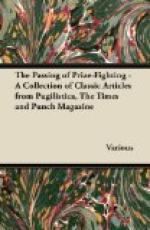“So sweet of you to have brought your dear children;” i.e., “Greedy little pigs!—gobble up everything before the real guests arrive.”
“Must you really go?” i.e., “About time—you’re the last but one.”
“Now mind—this is Liberty Hall—I always think true hospitality is, letting people do just what they like;” i.e., “If he’s late for breakfast—and IF he shirks driving with Mrs. MORSON!”
“We lunch at half-past one. But don’t trouble to be punctual. Quite a moveable feast;” i.e., “If he’s unpunctual, he won’t forget it.”
“Such a lovely drive I want to take you this afternoon;” i.e., “Must pay that call to-day.”
“Going to-morrow? Oh, do stay—we had looked forward to quite a week more. Can’t you alter it?” i.e., “Quite safe. Know he’s got to go.”
“Such a sweet girl to have in the house!” i.e., “Slaves for her from morning till night.”
* * * * *
[Illustration: A SEASIDE REGATTA.]
* * * * *
[Illustration: HAPPY THOUGHT.—DAVID COX REDIVIVUS!]
* * * * *
ALL THE YEAR ROUND;
OR, KEEPING UP THE BALL.
When September soaks the fields,
And the leaves begin to fall,
Cricket unto Football yields,—
That is all!
Yes—in hot or humid weather,
At all seasons of the year,
Life is little without leather
In a sphere.
In the scrimmage, at the stumps,
’Neath the goal, behind the sticks,
Life’s a ball, which Summer thumps,
Winter kicks.
From NAUSICAA—classic
girl!
Unto RENSHAW, GUNN, and GRACE,
Balls mankind must kick or hurl,
“Slog” or “place.”
Our “terrestrial ball”
is round,
(Is it an idea chimerical?)
Man, by hidden instincts bound,
Loves the spherical.
In rotund, elastic bounders,
Plainly the great joy of men is,
Witness cricket, billiards, rounders,
And lawn-tennis.
Now the championship is fixed,
Now the averages are settled,
Spite of critics rather mixed,
Slightly nettled.
Now the heroes of the Goal
Brace themselves for kick and scrummage,
Verily, upon the whole,
’Tis a “rum” age!
Wane the joys of Love, Art, Faction,
Parties rise and Parties fall,
The world’s sure centre of attraction
Is a Ball!
* * * * *
WARE SNAKE!
Says Professor Alfred Marshall, of Cambridge, the great English Economist, in his luminous Address at the British Association meeting:—




